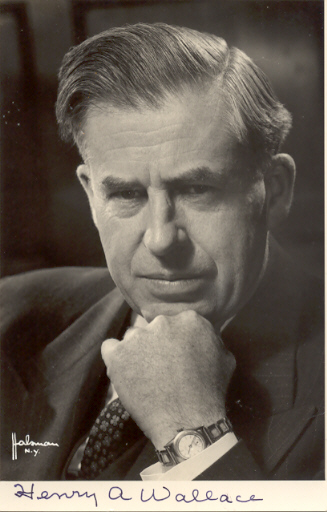•
1] What is to the left of left?The other day, Pumpkin asked for my "left hand." When I held up the hand to the right, she rebuked me:
Pumpkin:
That's your right hand!Dutchman:
I haven't got a right hand. This is my left hand.Pumpkin:
You've got two hands!Dutchman:
Indeed, I do!Pumpkin:
So, then what's the other one?Dutchman:
You mean — to the left of my left hand?
Pumpkin:
Yeah, that one!
Dutchman:
That's my Bolshevik hand!Sure this is a joke, but there is a point. You see, though "right" and "left" have meaning, their meaning is both relative and dependent upon your point of view.
2] Paul Nitze — from the left.The
Strategic Bombing Survey was established by Secretary of War Stimson on 3 November 1944, pursuant to a Directive from President Roosevelt. Its mission was to conduct an impartial and expert study of the effects of American aerial attack on Germany, to be used in connection with air attack on Japan and to establish a basis for evaluating the importance and potentialities of air power as an instrument of military strategy, for planning the future development of the United States armed forces, and for determining future economic policies with respect to the national defense. Several men of great future importance were to conduct this survey:
George Ball,
Robert Strange McNamara,
Dr. Galbraith, and
Paul Nitze.
In undertaking this survey, very quickly a divergence of views emerged from Dr. Galbraith, the economist and former head of the New Deal
Office of Price Administration, and Nitze, former investment banker and protegé of another former investment banker, Secretary of the Navy
James Forrestal. While Dr. Galbraith had actually talked to the German Minister of Armaments Production,
Albert Speer, and had come to the conclusion that "area bombing" was largely ineffectual at reducing industrial production, Nitze had talked to the Generals at
Bomber Command and the
United States Army Air Forces and was of an opinion that the effect upon enemy morale was significant, perhaps decisively so. Despite the final SBS report expressing Dr. Galbraith's view, Nitze continued to believe in and proselytize for "area bombing" until the end of this career.

In the early post-war era, Nitze served in the Truman Administration as Director of Policy Planning for the State Department (1950-1953). He was also principal author in 1950 of a highly influential secret National Security Council document (
NSC-68), which provided the strategic outline for increased U.S. expenditures to counter the perceived threat of Soviet armament. It is this document, more than any other, that lays the foundation for what
Gore Vidal has called the"National Security State," characterized by the demonization of an enemy, a permanent wartime economy, and sharply curtailed civil liberties at home.
When he was appointed to the Gaither Commission by President Eisenhower in 1956, Nitze broadened the scope of the investigation from the feasibility of nuclear defense (i.e. bomb shelters) to the whole issue of nuclear war. The
Gaither Report,resented to President Eisenhower on November 7, 1957, recommended a significant strengthening of U.S. strategic offensive and defensive military capabilities.
Nitze served Senator Kennedy in advisory capacity throughout his presidential campaign in 1960 and formulated the idea of the
"Missile Gap", the idea, later proved to be utterly specious, that the Soviets had established a commanding lead in ICBM's during the Eisenhower presidency. In 1961 President Kennedy appointed Nitze assistant secretary of Defense for International Security Affairs.
During the
Cuban Missile Crisis, Nitze sided with the hawks who wanted to invade Cuba despite the risk of thermonuclear Armageddon. His position being discredited by events, Kennedy took Nitze out of the nuclear loop by appointing him Secretary of the Navy in 1963.
Following his term as secretary of the Navy, Nitze served as deputy secretary of Defense (1967-1969), as a member of the U.S. delegation to the Strategic Arms Limitation Talks (
SALT) (1969-1973), and assistant secretary of Defense for International Affairs (1973-1976). Later, fearing Soviet rearmament, he opposed the ratification of SALT II (1979).
Paul Nitze was a co-founder of
Team B, a 1970s intelligence think tank that challenged the National Intelligence Estimates provided by George Bush's CIA. The Team B reports became the intellectual foundation for the idea of "the window of vulnerability" and of the massive arms buildup that began toward the end of the Carter administration and accelerated under President Reagan. Team B came to the conclusion that the Soviets had developed new weapons of mass destruction and had aggressive strategies with regard to a potential nuclear war. Team B's analysis of Soviet weapon systems was later proven to be largely exaggerated.
Nitze was President Ronald Reagan's chief negotiator of the
Intermediate-Range Nuclear Forces Treaty (1981-1984). In 1984, Nitze was named special advisor to the president and secretary of State on Arms Control. Nitze died in Washington, D.C, aged 97 in October, 2004.
So — this guy's a cold warrior, right? A real saber rattler, gung-ho capitalist,"
roll-back" kind of guy, right? Not an appeaser, is he? Able to go eyeball-to-eyeball with the Soviets and not blink, right? Without a doubt, Nitze was responsible for at least two significant U.S. military build-ups as well as several failures to de-escalate.
In other words, from a leftist perspective:
he's the problem!
3] Paul Nitze — from the right.In 1969 one Francis X. Gannon published a "Biographical Dictionary of the Left." This was a hard-right
tour d'horizon and denunciation of the left in this country. Gannon exposed and denounced the Reverend Doctor Martin Luther King Jr. as "preaching anarchism and racism and — when it suits his purpose — the straight Communist line." He denounces Robert Kennedy for his "vendetta" against Jimmy Hoffa and the U.S. Constitution while he "whitewashes" the United Auto Workers. And he exposes Paul Nitze for the groveling appeaser that he is:
During the Eisenhower Administration, Nitze was on the Gaiter Committee which issued a scaremongering report on alleged military developments and progress of the Soviet Union, and the Gaither conclusion pointed toward the necessity of a peaceful accommodation with the Communists.
Catch that? Gannon thinks that the Gaither Report had nothing to do with the significant build-up of American forces following the launch of Sputnik in 1957. He goes on:
In the Eisenhower Administration, Nitze was named to be Assistant Secretary of Defense for International Security Affairs, but the appointment was rejected by the Senate. Nitze's reputation was enough to all arm anyone seriously concerned with national security.
A reputation to alarm anyone seriously concerned with national security? Give me a break! I think what this shows is that no matter how far to the right you are, there is always someone nuttier than you who is going to call you "soft," "pink," or an "appeaser" And the word we have for these people is "nut case."
4] So Just Who Is To The Right Of Nitze?If you will recall, in 1963 Kennedy, because he wanted to kick him upstairs and put him in a postiion where he couldn't affect strategic decisions, nominated Nitze for Secretary of the Navy. Despite having such gilt-edge cold warrior credentials, he actually faced a challenge in the House of Representatives. A young, newly elected, representative attacked Nitze as being "soft on communism' and "an appeaser." Needless to say, these charges were not to be believed and Nitze was confirmed easily.
That new representative who attacked Nitze from the right was named
Donald Rumsfeld.
•





















